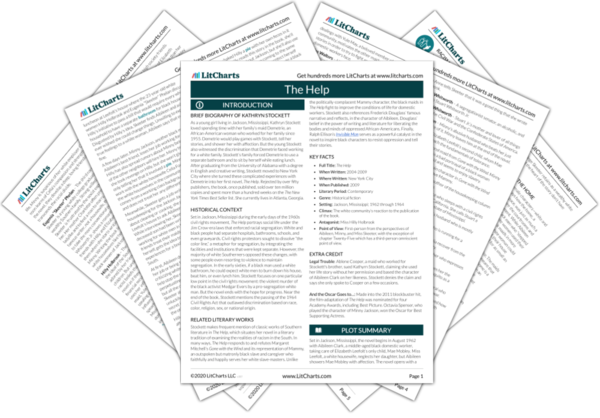Summary
Analysis
Skeeter had previously applied to a few editorial jobs in NYC and today she receives a response letter. The author of the letter, Elaine Stein, writes that she’s too inexperienced for the job and advises her to build her resume by getting a job at the local paper. She also offers to look over some of Skeeter’s ideas for nonfiction pieces because an older female colleague had done that for her once. Motivated by Stein’s interest in her, Skeeter writes a list of ideas she’s passionate about and mails them to Stein’s New York office.
Unlike Charlotte or Hilly, Elaine Stein ignores societal conventions that tell women that their place is in the home raising children, rather than in the workplace. Stein’s career thus provides a model for Skeeter of an alternative lifestyle beyond the prescribed path of becoming a Southern wife, mother, and homemaker.
Themes
The next day, Skeeter goes to Jackson Journal, a local paper, and gets an entry-level job writing the weekly housekeeping advice column “Miss Myrna.” The real Miss Myrna had a mental breakdown. With no housecleaning experience, Skeeter goes to Elizabeth’s house to ask her maid, Aibileen, for advice on common cleaning problems. Elizabeth agrees to let them talk the next morning for a few minutes as long as it doesn’t interfere with Aibileen’s duties.
The job offer illustrates the tremendous difficulty of overcoming double standards for women. The only job Skeeter can get is related to housekeeping, as if she as a woman couldn’t write about anything else. The journal symbolically forces Skeeter back onto the traditional path that leads women into the realm of the home.
Themes
The next morning, Skeeter reads Aibileen a few of the housekeeping questions that people have sent to the newspaper and Aibileen quickly dispatches the answers. Before she leaves, Skeeter asks if Aibileen knew why Constantine, a well-known and beloved woman in the black community, would quit and move away. Aibileen gets tense and says that she didn’t quit – she was fired. Mae Mobley starts to cry and Aibileen rushes out to avoid having to answer any more questions about Constantine.
Skeeter is still so ignorant of how to treat black people with respect that she exploits Aibileen’s knowledge for her own personal and financial gain—passing off Aibileen’s advice as her own without giving Aibileen any compensation. At the same time, the journal passes off Skeeter’s advice as Miss Myrna’s. All this upholds the idealized illusion of the flawless, all-knowledgeable homemaker when, in fact, the real Miss Myrna had a mental breakdown—perhaps under the pressure of this same illusion.
Themes
Upset about the news that Constantine was fired, Skeeter returns home and asks Charlotte if she fired Constantine. At first, her mother denies it, but when Skeeter says she heard people talking about it town, her mother admits that she fired her over a “colored thing.” Charlotte refuses to talk about it further, saying that it’s all in the past now. Skeeter feels outraged that her mother would fire their family maid of twenty-nine years who raised Skeeter from the time she was a baby.
We have already seen Charlotte uphold traditional gender norms, and now she also upholds the racist status quo in Jackson. Charlotte fires Constantine as if it were no big deal, illustrating that she had no emotional bond with Constantine or concern for her financial security. Skeeter’s outrage shows that she is finally beginning to see how unjustly white people treat African Americans.
Themes
Get the entire The Help LitChart as a printable PDF.

On a day when Elizabeth is out of the house, Skeeter returns to Aibileen for more advice. With Elizabeth out, Aibileen feels more comfortable speaking openly about herself and her past, even telling Skeeter about how her son, Treelore, was a writer. She tells Skeeter that he was inspired to write about what it was like working for white bosses after reading a book called The Invisible Man. Skeeter tells her that it was a brave idea for her son to write a book like that.
In their first interaction, Hilly treated Aibileen as if she were invisible. Now, Aibileen references Ralph Ellison’s famous book The Invisible Man, which depicts the inability of white oppressors to see the black protagonist because of his skin color. Like the main character of that book, Aibileen must find ways to assert her visibility and individuality in the racist white world.
Themes
Feeling a small connection develop between them, Aibileen tells Skeeter that it’s wrong that she doesn’t know the truth about why Constantine left. Aibileen says her mother, Charlotte Phelan, fired Constantine because of something to do with Constantine’s daughter coming to find her. Skeeter, who never knew Constantine had a daughter, presses Aibileen for more information, but she won’t say anything else.
Skeeter felt some empathy for Treelore when she commented on his bravery in speaking out against his employers. Now, Aibileen sees from Skeeter’s perspective, realizing that Skeeter must be in pain because of Constantine’s disappearance. These genuine attempts at understanding allow the women to speak openly in a way they were incapable of doing before.
Themes
A few days later, Skeeter receives another letter from Elaine Stein. Elaine writes that her ideas were dry and boring and that she only has permission to write her again if she comes up with an idea that has more life to it. Wondering if she’ll ever write anything important, she hears Pascagoula leaving and gets an idea. She knows the idea would be “crossing the line,” but it won’t go away.
“Crossing the line” is a play on words: superficially, it signifies Skeeter’s concern over transgressing or “crossing” some social taboo or official rule. But, it also refers to the phrase “the color line”—a metaphor for segregation. Skeeter combines these two meanings, showing that in her society, crossing the color line also means crossing a legal and social line.
Themes












